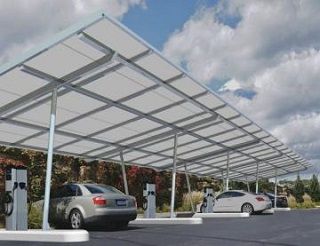Did You Hear the One About the Guy Who Goes Into a Car Dealership….

I have great respect for those who buy solar power systems for their home in order to offset the burden of their EV. My problem is that I have equal respect for those who buy solar panels to offset their ICEV. Or those that just invest in wind farms in the Midwest, or in aforestation projects in Africa and Brazil… The atmosphere doesn’t really make a distinction: In both cases, there is a burden, and in both cases there is a purchased offset for that burden.
I’ve spent the last few minutes milling around my office chewing on this. I find it hard to agree. Yes, the environment would be better off right this minute without electric vehicles, regardless of how much or how little PV is installed (though there are many other reasons to support EVs).
But let’s examine what happens in the real world of transportation choices. A guy goes into a car dealership and says to himself, “I’m opening my checkbook—extra wide. Instead of a $30K LEAF, I’m going to buy a $45K LEAF (a LEAF with a 5kW PV array on a canopy), and I’m doing that so that the car I’m buying will have very close to zero environmental impact.” He wouldn’t have a PV canopy in his driveway if he didn’t have an EV.
He may have PV on his roof already — or he may not. Maybe he stays away from single-use plastic bags—or maybe he eats Big Macs or poaches rhinos. None of this matters in this context. He’s just made a car purchase, and paid extra for it, specifically so that his mode of transportation will not burn coal. Simultaneously (as I note in the article linked above), he’s probably also motivated by the fact that his decision to purchase an EV has numerous side benefits, e.g., it does not enrich terrorists and it does not encourage and empower the oil companies that are apparently more than happy to ruin our planet.

Um… Craig?
You do realize that there were ~110,000 EV’s sold last year, and ~50,000 solar PV systems sold last quarter alone.
I believe that for every one EV owner that buys a solar array to offset his car, there are three or four ICEV owners who buy solar PV systems to offset their lifestyle.
There are also millions of people invested in renewable energy or efficiency technology – most of whom have ICEV’s.
There are also several hundred thousand people participating in carbon offset markets, and of course in Europe everyone is participating to some extent in offset markets. EV owners don’t have a monopoly on caring about the environment. They don’t yet even have a significant share. They just have a monopoly on caring about EV’s – which are bad for the environment.
*shrug*
😉
What we’re dealing with here is a growing trend toward installing PV that otherwise wouldn’t exist as a means to charge EVs. In other words, the PV exists only because of the EV. That, my friend, is unequivocally good; there’s no way you can convince me or anyone else otherwise.
Craig,
I wasn’t trying to convince you otherwise. I had stated that a person who does NOT buy an EV but purchases a PV system or carbon offsets is doing as much good as the EV buyer who purchases a PV system to offset his burden.
You then stated that this doesn’t happen. It clearly does, and will continue to do so.
In all of these scenarios, the good is in the offset mechanism, the vehicle is the burden. This should be easy to agree. I have agreed that those who offset their EV’s are doing a net good, I simply asked that you agree that those who offset their ICEV’s are doing a net good.
The atmosphere doesn’t care where the emissions come from or where the offsets come from… it’s just a scorekeeper – net emissions increase = bad, net emissions decrease = good.
Oh, I completely agree with that. But isn’t it also true that the existence of EVs is an overall good thing in cases when it’s the (only) reason that a certain person would install PV?
Craig,
I guess here I’m the one who remains unconvinced. I don’t understand the mentality of a person who would purchase an EV because they believe it’s good for the environment, and they would then purchase a solar power system to power their EV because they know it’s good for the environment… But they would not invest in renewable technology or purchase a solar power system if they did not first go purchase an EV.
I don’t see the connection between the two: The investment in the carbon offset is an entirely different transaction than the investment in the vehicle. Even if the two are sold in the same store, they’re different and unrelated purchases. It would be like crediting chainsaws for the solar PV adoption curve since Lowes sells home-unit PV systems.
It’s the PV systems that are the good things, not the chainsaws…
I can’t wrap my head around the logic here.
a) No one’s asking you to “understand the mentality” of these people. They exist nonetheless, and in ever-increasing number. I.e., there are a lot of people who, in fact, mentally “couple” EV and PV purchases, whether or not you and I agree with their logic. There are not, as far as I’m aware, those who couple chainsaws and PV (and certainly not just because they happen to be sold at the same store).
b) As I’ve written elsewhere, there are a couple of humanitarian reasons that go beyond the simple trade-off of oil/coal emissions that militate towards EVs vs. petroleum.